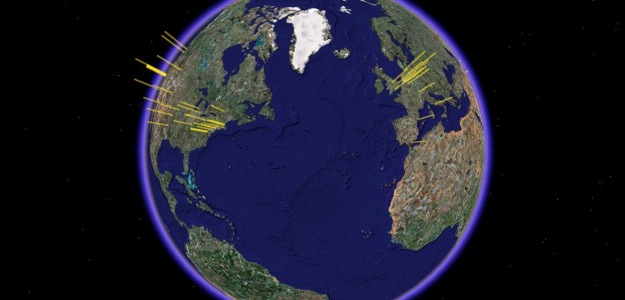 The problem with Google Earth, the online global mapping service that mixes satellite imagery with traditional maps to create an interactive atlas, may be that it acts as a cover story for more nefarious purposes, including spying on behalf of intelligence agencies from the Western World. At least, that’s a criticism of the service offered by Iranian authorities, who are so incensed by the concept of Google Earth that they’ve announced the forthcoming launch of Basir – an app that does exactly the same thing, but made for Iran and other Islamic countries.
The problem with Google Earth, the online global mapping service that mixes satellite imagery with traditional maps to create an interactive atlas, may be that it acts as a cover story for more nefarious purposes, including spying on behalf of intelligence agencies from the Western World. At least, that’s a criticism of the service offered by Iranian authorities, who are so incensed by the concept of Google Earth that they’ve announced the forthcoming launch of Basir – an app that does exactly the same thing, but made for Iran and other Islamic countries.
Barsi (Farsi for “spectator”) is described by Iran’s minister for information and communications technology Mohammad Hassan Nami as “Islamic Google Earth,” and should launch within the next few months, according to a report from the quasi-official Mehr news agency. “Preparations have been made for launching our world’s 3D map project, and we are currently creating an appropriate data center which could be capable of processing this volume of information,” Nami reportedly said. It is unclear how different Barsi will be from the real Google Earth data-wise.
“We are doing our best to launch the Islamic Google Earth in the next four months as an Islamic republic’s national portal,” he continued, “providing service on a global scale.” Nami cites a simple reason for needing an alternative to Google Earth. “On the surface, Google Earth is providing a service to users,” he admitted, “but in reality security and intelligence organizations are behind it in order to obtain information from other countries.”
Amusingly, he’s not entirely wrong; there genuinely is reason to say that “security and intelligence organizations are behind” Google Earth – at least in one sense. After all, Google Earth’s earliest incarnation was “EarthViewer 3D,” a program created by Keyhole, Inc., a company funded by the CIA. Of course, that doesn’t mean that the CIA or related parties are still using the service to gain any kind of illicit information. Right?
This is far from the first time an Iranian official has criticized Google. Last year, the country’s police chief, Esmail Ahmadi Moghaddam, reportedly described the company’s search engine as “a spying tool.” Both Gmail and Google Earth have also been the subject of “filtered service” in the country at various times in the past, with some search results rumored to have been purposely blocked.
The question of whether Nami’s prediction of an Islamic Google Earth replacement has basis in reality has been raised; one IT expert with experience of Iran’s communications network suggested that it may have been some unexpected April Fools-type joke, due to the size and scale of the project and projected timeframe. Anyhow, we’re four months away from finding out.


